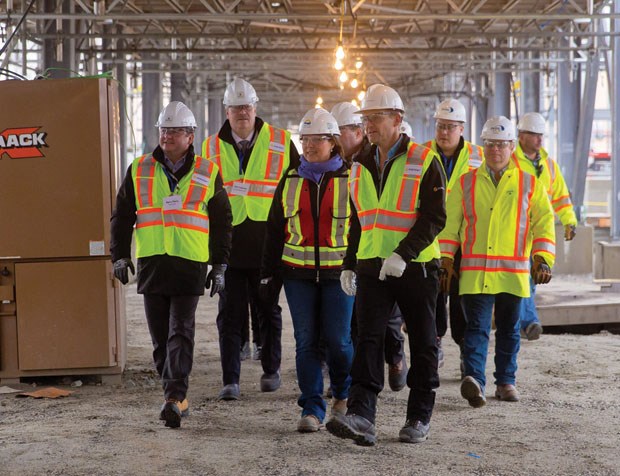Delta is benefitting from the expansion of FortisBC's LNG facility on Tilbury Island. Over the last year, the project has created thousands of hours of well-paying trades work, is contributing to the local economy, and is helping the province and industry meet environmental commitments.
We officially broke ground on our Tilbury LNG expansion project in October 2014, which will significantly increase LNG production and storage for the domestic market by winter 2016. To date, FortisBC has committed more than $50 million in local contracts. Through our general contractor Bechtel Canada Co., we've engaged more than 100 businesses across 10 Lower Mainland municipalities.
For companies like Delta-based Ideal Welders Ltd., working on the Tilbury expansion means employees can work where they live. According to Ideal Welders president Jim Longo, our expansion project is keeping his company's shop in Delta busy and allowing staff to work close to home and contribute to B.C.'s economy. There are now more than 475 tradespeople registered to work on the project, represented by 10 B.C.-based unions. So far those workers have logged a collective 65,000 fulltime equivalent hours on the expansion. Today, we have 130 people working full-time on the expansion.
While the discussion around LNG has largely focused on its economic and employment benefits to B.C., it's important not to overlook the environmental benefits of LNG. For several years, FortisBC has been helping the transportation industry adopt natural gas as a cleaner fuel option. With B.C.'s transportation industry responsible for the largest share of provincial greenhouse gas emissions, converting fleets and vehicles to natural gas will help the province meet its 33 per cent carbon reduction goal by 2020. That's because LNG puts about 25 per cent fewer GHGs into the atmosphere.
Both B.C. Ferries and Seaspan Ferries have announced the construction of LNG ferries, some of the first marine vessels of their kind in Canada. That is important because since the English Bay oil spill this past summer we're all sensitive to the risk of using heavy oil and diesel as a marine fuel. With stricter marine emission regulations coming into force in North America, LNG is seen by many as an opportunity to help reduce that risk.
In fact, a study commissioned by the World Wildlife Fund Canada related to shipping in the Arctic found that switching to LNG from heavy fuel oil would mean a reduction in all pollutants as well as greenhouse gas emissions. And the safety risks associated with spills are greatly reduced. As the WWFCanada study observed, LNG dissipates into the atmosphere almost immediately.
The B.C. Environmental Assessment Office is currently reviewing a proposal by WesPac Midstream - Vancouver LLC to build a marine jetty adjacent to our Tilbury facility. The jetty would support marine bunkering of LNG fueled ships and allow us to transport LNG abroad to markets such as Hawaii where oil-based power generation is still the norm.
The Tsawwassen First Nation (TFN) is also consulting its members on an unrelated LNG export facility concept on Tsawwassen lands. TFN leadership has promised that, if approved, "every step will be done in a manner which is consistent with TFN's values and environmental interests."
At FortisBC, we're proud to be a part of this important industry which is bringing clear benefits to the community of Delta and its residents.
Michael Mulcahy is the president and CEO of FortisBC.



